If you are looking for what to play at this weekend’s Modern Open Series in Charlotte, I would say play what I’m playing at Worlds. Except the answer to that is either “I don’t know” or “I won’t say.” Keeping secrets is both fun and sucks at the same time.
Instead, I’m going to focus on the other half of my preparations for Worlds. The big difference between this event and even a Pro Tour is that there is no one that I am going to be able to straight-up out-skill. Fewer games will be handed to me, and in return I have to give away fewer games to keep up my edge.
Beyond the format testing, here are a few of the things I’ve found in terms of general game improvement that I can pass on in some sensible way.
“Your Cards Don’t Have Provoke”
The first time I remember seeing this quote was in an old Paulo Vitor Damo Da Rosa article titled “Playing on Autopilot,” but he references it as an old saying so I have no idea where it is from.
The general way Paulo uses it is describing cards that people think are always cast in the same way. Current examples would be slamming early Thoughtseizes when you instead want to position them to resolve a threat against control or take their Dragonlord Atarka or Ugin, the Spirit Dragon at the last possible moment, or casting Simian Spirit Guide as a 2/2 in Modern instead of locking it in as a Ritual (a mistake I made fairly recently when playing a Goryo’s Vengeance mirror against Joe Losset in Round Three of these videos).
The way it applies in Magic Origins Limited is a bit different. Just because the card is in your hand doesn’t mean you have to cast it. This is somewhere along the lines of the old-school “Save your removal for exactly the threat you lose to,” only the cards are way better so there are a lot more things you want to line your card up with so saving it still won’t take very long.
The specific thing with Magic Origins Limited is that there aren’t a lot of ways to pull ahead on raw cards, so it’s more about lining up your cards so that you are left with good ones while they are left with stinkers. Sometimes you can take advantage of tempo disparities, but in a situation where both decks are going to play fairly smoothly most games (Team Sealed or just Draft with the Scry mulligan rule) that’s really hard to pull off. Almost every mistake I made at Grand Prix Detroit can be attributed to pulling the trigger on something at the wrong time.
While this should be easy, the thing I’m struggling with is why my internal metric is set towards being aggressive. At some point there had to have been a format where I was heavily rewarded for just jamming on-curve way more than waiting for increased value, and it skewed everything since then. My guess is that it was Zendikar, as I played that format around one of the times I started getting significantly better at the game. Since then, I’ve performed a lot worse at formats where this kind of marginal value was more important than tempo, trumps, or raw cards. This is the same “I suck at Sealed midrange” issue I’ve discussed countless times, but now that I’m thinking about it in these terms, it really feels like I’m way closer to a solution than I have ever been before. Or at least a more consistent one than “Make sure every Limited deck I play has a definite plan and fail horribly when I just play cards.”
Biasing Mana
I hit the “jackpot” here by messing this up both ways.
At Pro Tour Magic Origins, I played a deck with four Consul’s Lieutenants and eleven Plains. I clearly needed twelve, thirteen or even fourteen to support what that deck was doing. At Grand Prix Detroit, my Day Two deck was a G/R deck splashing for two Blazing Hellhounds off of two Evolving Wilds and one Swamp. This time I should have played two Swamps and cut a Forest or Mountain.
Everyone always looks at mana symbol counts, but I think the time frame required to complete your mana costs might be even more important. With a card like Consul’s Lieutenant, you are getting way more out of the card on turn two than you would even on turn three. I’ve always tried to pay attention to this by piling early drops on top of double-colored cards when determining manabases (ie. Topan Freeblade and War Oracle are both flagged as reasons to play more Plains), but I don’t think deeply enough about how the game will play out and when I absolutely need to cast those two drops. Leaf Gilder is more of a reason to play nine Forests than Elvish Visionary because the mana accelerant is way better on turn two than on turn ten whereas the cantrip might even be better the longer things go.
To use my “Jund” Team Sealed deck as an example, it had a lot of early action split across both the base colors of green and red but besides three Akroan Sergeants and an Undercity Troll most of the creatures were still just as good a few turns later as they would have been on-curve. This was especially true of the two Boggart Brutes, which is often harder to handle on turn five or six when the board has traded and lining up the double block is almost impossible. I could afford to draw that Forest a turn later if it meant being more likely to actually use my Blazing Hellhounds in a midgame off the second Swamp.
Obviously these are the corner case – two decks out of probably around 40 Magic Origins Limited decks I’ve played – but 5% is still a lot of edge to be throwing away.
“Should I Keep This, Cedric?”

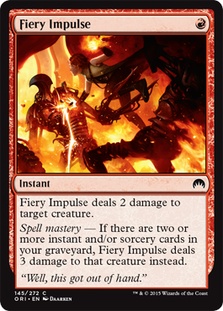
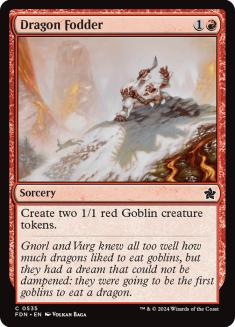
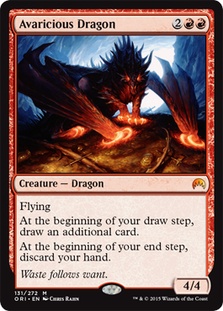
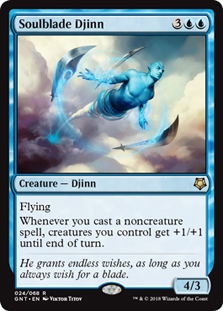
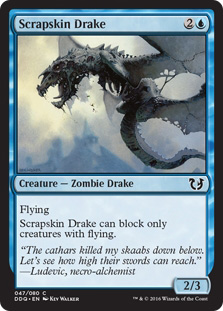
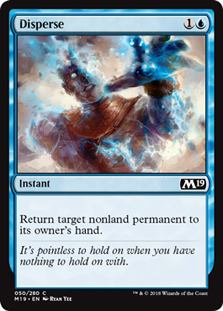
This was a bit of an ongoing joke all tournament at Grand Prix Detroit. I even got to mix it up by running the “Should I keep this, Cedric? I want to mulligan” when it was an average looking hand that was just a little too do-nothing to keep.
Maybe one of the reasons I think the Scry mulligan is so broken is because it makes me want to make good decisions. I really try my hardest to keep loose hands, probably because I play a lot of decks that are rewarded for doing so. I’ve obviously known this forever.
Cedric really put it best: “The seventh card is a luxury.” The drop in win rate from a seven-card hand to a six is 13% in Magic Origins, which is shockingly much less than I would have assumed in a format where everything trades. Do you think that your seven is winning the game more than a third of the time? If not, you are better off throwing it back.
Six cards makes it hard to win. So does keeping a crappy seven.
Pro Tour Standard Is Not Normal Standard
I’ve never done well at the Grand Prix the week after a Pro Tour. My 6-3 finish at Grand Prix San Diego might have actually been my best one ever for such an event. It might even be possible that, over the last couple of years, my Standard Grand Prix win rate is below my Pro Tour Standard win rate. And just based on the quality of my Pro Tour opponents that really shouldn’t be true.
The problem is that I keep playing the two the same when they are in fact completely different formats.
Pro Tour Standard is a lot about being able to handle the unknown. At this last event, we spent hours and hours playing games against Abzan, specifically after sideboarding and on the draw, with our G/R Devotion list… and in the end, I think I played the matchup once. Instead I played a bunch of aggro and combo. It was still good practice, as it was an extremely hard matchup and it was the Magic equivalent of training with weights on, but what was more important to our reasonable success was that no matter what we were playing against, curving out Sylvan Caryatid, Xenagos, Whisperwood Elemental would probably beat them.
I don’t want to say it’s rare that a control or midrange deck is the best deck at a Pro Tour, as it has happened twice in the last year, but it always happens when the deck gets a threat or answer that is just insane. At Pro Tour Khans of Tarkir, Abzan was just mono-good cards and generic answers. As a worst-case scenario, Siege Rhino into Siege Rhino can just beat people. Similarly, at Pro Tour Dragons of Tarkir, Silumgar’s Scorn and Dragonlord Ojutai played the same role. Wait, what’s your deck do? Get counterspelled? Die to a 5/4 flying Hexproof that draws cards? Okay, that works for me.
Standard Grand Prix are a lot more about being able to handle the known. My current methodology is to start at Point A and test against random things on Magic Online until I move to the next point or find something I like, and while that does produce good results at times it takes way too much time to be practical. Honestly, it might even take so much time that your initial results don’t mean anything and you are losing valuable info due to it just decaying over time.
Instead of a biased random walk, I need to be much more focused. The same process can apply, but I need to dictate the matchups I face in order to determine what is good against the known portion of the field.
Learning The Game Conflicts With Learning The Format
This has been the hardest part of my testing so far.
Learning a format and getting better at Magic itself are often really opposite processes.
Learning a format is about getting in as many matches as possible in as little time as possible in order to narrow down general options and find weak points. This often means glossing over technical play. You learn a lot about technical play in the later stages of shoring up weaknesses, but a lot of it is really narrow. You can extrapolate some big lessons from testing twenty games of Storm versus Landstill, but it’s a lot of things that are only relevant again in context of similar matchups.
Learning the game is a lot more about stepping back from situations and realizing what should or could have happened. This is really hard to do when you are iterating a ton, as you simply don’t have the time. There’s also a weird point where you can know too much about the format and learning new things becomes hard. Your heuristics are so specific and narrow that you are making what is likely the right play without reasoning beyond “this is statistically the best choice.” I’m usually pretty good at picking out the fundamentals at play from that point, but that doesn’t necessarily make me good at knowing them before the first time I lose for that reason.
I’ve also personally noticed that I tend to get more introspective when the losses sting. Most of the time, testing losses mean nothing… but losing at a Grand Prix or Pro Tour to a punt? I don’t forget those. Maybe this means I need to step back more in testing to figure things out, but that costs me time I probably don’t have. More likely, it means that I need to find a way to make test games matter to me more. Maybe this just means playing more events (do I sense some more Open Series events maybe?), some drafts with people who are more willing to ruthless berate me for losing like back in my college days, or something else yet to be determined. I also may just need to play more matches with the express intent of learning to play better.
Returns Are Gained Where The Work Happens
Despite, you know, winning a Pro Tour and whatnot… I don’t actually think I’ve gotten significantly better at playing Magic since around 2013. I’ve spent a lot of time getting better at testing for Pro Tours and it has obviously shown, but playing the game has come second to that.
The big lesson across several of these points is that I need to get better at shifting my focus to new things as they arise. This ties into me not shifting between Pro Tour and Grand Prix Standard formats, not focusing on learning, and even stuff like missing new decks when sets come out.
That 2013 landmark is when I went from just playing a ton to playing really to focus on specific things. The best analogy I can think of is Pokemon stats, where I’m not grinding just for level anymore but am now beating up 200 Geodudes specifically to max out my Defense stat or whatever. There’s a cost to that in terms of overall development.
I just need to think more about why I’m doing what I’m doing. I clearly make huge gains when I try to do so in any one area. I just need to choose my focus wisely and make progress in the right places and everything will fall into place from there.
